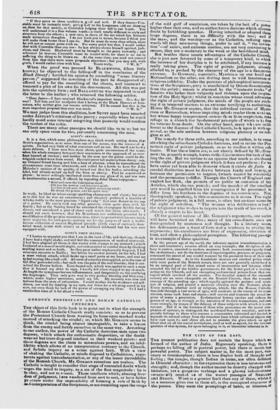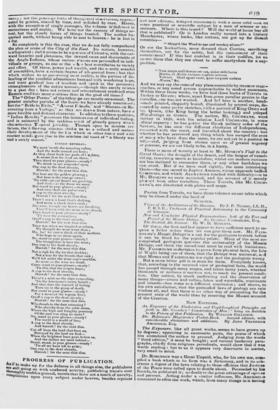THE CITY OF THE EAST.
THE present publication does not sustain the hopes which we formed of the author of India. Rigorously speaking, there is perhaps no falling off in poetical power, but there is mile!) less powerful poetry. The subject matter is, for the most part, visi- onary or commonplace; there is less display both of thought and feeling ; the images, though Indian in name, are often deficient in Oriental character ; in the expression there is less terseness and strength; and, though the author cannot be directly charged with imitation, yet a gorgeaus verbiage and a gloomy indistinctness eeeasiol ally remind us of the worser passages of SHELLS! and BYRON. W hat is a greater fault than any of these, whtlat it in a measure gives rise to them all, is the uninspired character St the poems. They seem the prompting% of habit, or idleness, Or Yam,' ; not the pout wes torte of thougi.titil wasersatum, nated by genius, shaped by time, and polished by care. Hence, With the exception of single passages, the volume italetleient ii earnestness and reality. We have not the essence of things ac- tual, but the cloudy forms of things fancied. The author has quitted earth, without being able to soar to heaven : he is lost in a fog. So completely is this the case, that we do not fully comprehend the plan or scope of the City of the East. Its nature, however, is allegorical ; and it seems to be a !het u re of Calcutta, with the out- ward luxuries and pleasures, the inward cares and discontents of the Anglo Indians, whose various &asses are personified in indi- viduals or groups, as one or the tilti best contributes to variety and effect. Of these, power awl wealth, and the ci.urtly scandal of assemblies, have a certain degree of allegorical force ; but that which strikes us as pos-essing most reality, is the picture of the landing of the youthful adventurers buovant Ivith wondering hope, and tneir gradual loss uf freedom and spirit in the pecumaty entanglements of the native usurers,—though this surely relates to a past day : have not reform and retrenchment rendered even Eastern creditors more mintious than in the good old times? The "Other Poems" of the titlept ge are mostly occasional. The greater number partake of the faults we have already mentioned ; but the " Bride in Exile," "Absent Fi kinds,- and "Stanzas on Re- covering from a Vertigo," as they are drawn from nature, have a more forcible and distinct character. In addition to these qualities, "Indian Revelry " possesses the intense' ess of individual feelitig. and is animated by the reckleas twilit of ghastly gayety which chatacterizes T.opical joviality. Though open to minute cri- ticism, the ft Bossing stanzas strike us as a refined and melan- choly develoi moult of the let-Tig which in other times and with coarser minds gave rise to the sentimeutal toast of " a bloody war and a sickly season."
INDIAN REVELRY.
We meet 'neith the sounding rafter,
And the walls around are btre;
As they shout hack our peals of I, nffiter, It seems that the dead are there. Then stand to your glasse4—steady !
We drink in • comrades' eyes, One cup to the dead already, Hurrah ! for the next that dies. Not here are the goblets glowing ; Not here is the vintage sweet ; 'Tis cold—as cur hearts are growing, And dal la—at the doom we meet. But stand to your glasses—steady And soon shall our pokes rise; A nip to the otead already, Hurrah ! for the next that dies. There's malty a Itotolol that's shaking, Aud many a cheek that's sunk ;
But , though our hearts ale hreak3ng, They'll born with the Wine we've drunk. Then titatiol No your glivows—edemly 'Tis here the revival lies;
Quaff a cup to the dead already, Hurrah! fot• the twxt that dues.
Time was when we laughed at others,
We thought we were wiser then ; Ha, ha! let THEM think of their mothers Who hope to see them again.
No, stand to your glasses—steady!
The thoughtless is here the wise;
One cup to the dead already, Hurrah ! for the next that dies.
Not a sigh for the lot that darkles; Not a tear for the friends that sink ;
We'll fall midst the wine-cup's sparkles, As mute as the wine we drink.
Come stand to your glasses—steady ! 'Ti. this that the respite buys;
A cup to the dead already, Hurrah ! for the next that dies.
The' es a mist on the glass congealing,
'Tis the hurricane's sultry ',teeth ; And thus does the warmth of feeling Turn ice in the grasp of death. But stand to your glasses—steady ! For a moment the vapour flies; Quaff a cup to the dead already ; Hurrah ! for the next that dies.
Whodreatls to the dust returning? Who shrinks front the sable shore,
Where the high and haughty yearning
Of the soul can sting no more? No, stand to your glasses—steady! The world is a world of lies; A cup to the dead already, And hurrah ! for the next dies.
Cut off front the land that bore us,
Betrayed by the land we find—
When the brightest have gone before us,
And the dullest are most behind—
Stand, stand, to your glasses—steady !
'Ti, all we have left to prize;
One cup to the dead already,
Hurrah ! for the next that dies.



























 Previous page
Previous page